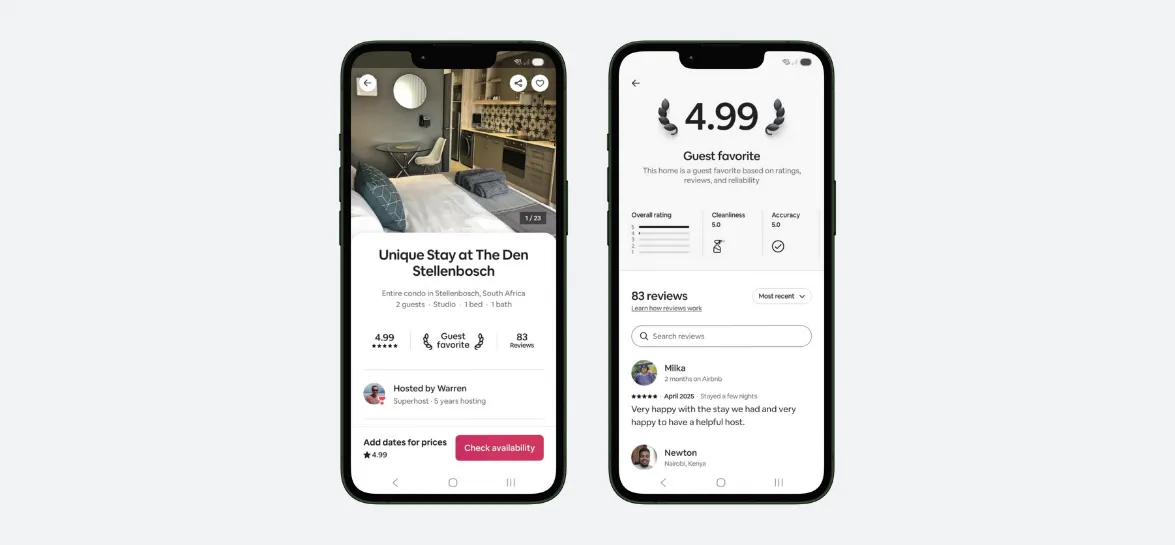How To Attract More Tourists To Your Cape Town Business

The gorgeous Mother City of Cape Town get’s a steady stream of tourists all year round.
The mountains, the beaches, the food, the festivals, the rich history. Cape Town’s packed with options.
If you run something like an Airbnb, shuttle service, or any other tourism-based service, those tourists could be booking with you. But only if they can find you first.
Let’s go over what tourists are typically looking for, how they search, and where you can meet those needs better.
How tourists search for services in Cape Town
Most tourists use Google first
This probably isn’t surprising. The first place most people turn to when looking for local services is Google.
They’re typing things like “best airport transfer in Cape Town” or “affordable Airbnb near Stellenbosch”.
They may even add qualifiers like “safe”, “trusted”, or “English speaking” when they feel unsure or overwhelmed. If your business isn’t showing up for those kinds of searches, you’re missing out.
You don’t need to rank for everything. Focus on your area and the actual words people use. “Private airport shuttle from Cape Town airport to Claremont” is a very different search from “cheap shuttle service Cape Town CBD”. If you serve one specific route, say it.
Also, tourists don’t always know local suburb names. Someone might be staying in Gardens but searching “near Long Street”. Keep this in mind when writing service descriptions or titles on your website.
They check reviews before contacting you
Before reaching out, tourists nearly always read reviews. Google Reviews carry a lot of weight, but TripAdvisor and Airbnb reviews matter too, especially for accommodation or tours.
If your Airbnb only has a few reviews, you’re less likely to get the booking versus an Airbnb that has lots of reviews. So it’s worth investing some time to ask every happy client to leave a review.

What tourists actually want from local services
Clear pricing without surprises
People coming to Cape Town from overseas often don’t know what kind of prices to expect and might be working within a specific budget.
They want to see prices upfront or at least get an idea of what things cost. If your website says “Contact us for a quote” and that’s all, you’re losing them. If your prices are based on variables, say something like “prices range from R350 per [service]” or “half-day tours start at R1200”. Being vague doesn’t build trust, but being transparent does.
Easy booking and fast replies
Tourists are on the go. They’re probably using their phone so they don’t want to download PDFs, wait for email replies, or call South African numbers from overseas.
You need some form of quick booking option. This could be a WhatsApp link or button, or a booking form that works well on mobile, or a direct link on Airbnb or TripAdvisor if applicable.
Also, reply quickly. Even if you use an autoreply that says “Hi, thanks for the message, I’ll confirm details shortly”, it helps. Tourists often message three different providers at once and book with whoever replies first.
Locally relevant, tourist-friendly info
Most tourists aren’t looking for a basic product list. They want context.
For example, if you offer a private wine tour, don’t just list what’s included.
Add something like “This route is ideal for couples staying in the Southern Suburbs who want to avoid long drives. We start early to avoid crowds and finish before peak traffic.”
That shows you get the local logistics, which they often don’t. It also reassures them they won’t end up spending more of their day stuck in a van than enjoying the activities planned.
Top services tourists search for in Cape Town
Here’s a look at services that are often searched for by Cape Town tourists, with examples of how they search:
Transport services
- “Cape Town airport transfer to Camps Bay”
- “private driver Cape Town hourly rate”
- “Uber vs shuttle cape town price safe 2025”
Airbnb hosts and accommodation
- “quiet Airbnb with Table Mountain view”
- “self-check-in guest house Sea Point”
- “airbnb with fast wifi in Stellenbosch”
If you host on Airbnb, make sure your title and description mention what guests actually care about. Don’t just say “central location”. Say something more direct like “7-minute walk to Bree Street, fast uncapped WiFi, solar backup during load shedding”.
First-time visitors may check out your address on Google maps and view the distance to the places they plan on visiting. So mention local landmarks and street names to reassure them that you’re the best choice for their stay.
Local experiences and private tours
- “Table mountain hike”
- “safari day trip from Cape Town”
- “Robben Island private guide”
Here, uniqueness matters. If your tour offers something different, maybe a local lunch stop tourists might not find on their own, then say that.
Simple ways to make your service easier to find
Here are a few changes you could make to help tourists find your services.
Optimise your Google Business Profile
This is free and incredibly useful. Add the following:
- Clear service descriptions that match the services on your website
- High-quality photos. Use real ones, not stock photos.
- Service areas and operating hours
- Real reviews
Try to keep it updated often, at least once a month. Google picks up on fresh updates.
Add location keywords to your website
Don’t overdo it, but do add clear location signals. Instead of just saying “We offer wine tours”, you could say “We offer wine tours for guests staying in Cape Town CBD, Gardens, Sea Point and surrounds”.
Mention nearby landmarks. Tourists are more likely to search using place names and popular tourist attractions than suburb names.
Be easy to contact (in more than one way)
Not everyone uses the same apps. In South Africa, WhatsApp is huge.
But a lot of tourists come from places where WhatsApp isn’t quite as common. Some might prefer email, while others will message you through Facebook or try to find a contact form on your website.
You can’t assume they’ll all use the same method, so give people more than one way to reach you. Ideally your website should have the following:
- A visible phone number (with the international dialling code)
- A working WhatsApp link or button
- A simple contact form
- An email address
- Social messaging like Instagram DMs if that’s where you’re active
These should be displayed clearly on every page of your website, especially on mobile.
Add your business to local directories
Local directories are an easy way to get your business in front of more people. Many tourists browse these platforms when planning what to book next. If you’re listed, there’s a better chance they’ll come across your service without needing to dig too much.
Here are a few directories you could use:
Having your services listed also helps with social proof that you exist, as well as providing backlinks to your own website, which is good for search engine rankings.
How to attract more tourists to your Cape Town business
We hope this article has helped you with some insight on changes you can make to help attract more tourists to your business.
Tourists just want to find what they need without hassle. If your business is easy to discover, easy to understand and easy to contact, you’re already ahead of most others. No need for complicated strategies. Just show up where it counts. Most of the time, it’s small things that make the difference.
If you run a local service in Cape Town, these changes can help you stand out without spending money on ads or chasing algorithms.


